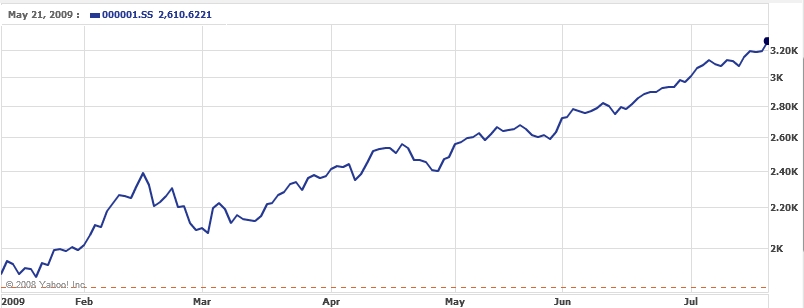SSE Composite Index Bubble?
Posted by John Baez
Physicists like to complain that economists don’t make enough testable predictions. There’s a geophysicist at UCLA named Didier Sornette who has tried to remedy this situation. Here is his latest paper on the arXiv:
- K. Bastiaensen, P. Cauwels, D. Sornette, R. Woodard, and W.-X. Zhou, The Chinese equity bubble: ready to burst, July 10, 2009.
I was pointed to this paper by Robert Schlesinger. The paper claims that an equity index called the Shanghai Stock Exchange (SSE) Composite Index is exhibiting faster-than-exponential growth, that it’s in a “bubble” — and that this bubble will burst between July 17th and 27th with 60% probability. It hasn’t burst yet:
You can watch how it does on Yahoo. It’s interesting to see how different the chart looks on different time scales.
For more, try:
- Econophysicist predicts date of Chinese stock market collapse, The Physics arXiv blog, July 14, 2009.
Sornette has a model of bubbles, and he’s been using it to make predictions. For example:
- Wei-Xing Zhou and Didier Sornette, Is there a real-estate bubble in the US?, June 3, 2005.
predicted the turning point of the real estate bubble in mid-2006. (Does that count as a success?)
For a sketchy but readable explanation of Sornette’s model, leading up to his “log-periodic power law”, try this:
- Didier Sornette and Ryan Woodward, Financial bubbles, real estate bubbles, derivative Bubbles, and the financial and economic crisis, section 2.3: Finite-time singular behavior of bubbles.
This has references to more technical stuff involving some ideas from condensed matter physics.
Needless to say, don’t make any financial decisions based on what you read at the -Category Café.


Re: SSE Composite Index Bubble?
I’ll make a snarky comment: a more common complaint is that economists and physicists-turned-economists don’t make enough potentially-falsifying predictions. (Ie, they tend not to make predictions that, if they disagree with the observations, can’t be explained away by invoking reasons why the model, whilst valid in general, wasn’t appropriate this time around. Lots of economists and physicists seem to make lots of “testable predictions” that aren’t seen as “binding”.) The paper is the distillation of what I’m sure is very good theoretical work but doesn’t really address the issue of what conclusions about the practical usability of the model should be drawn if SSE doesn’t crash within that period.
(Of course that’s a little unfair in that in my field of machine learning – where there’s no intent to make “physically true” models, only effective predictive models – there’s the opposite problem: most people fuzz the line about whether a given performance level on given test data is really suggestive of effective performance on eventual application data which always contains many more strange and confounding factors than encountered in the test set.)